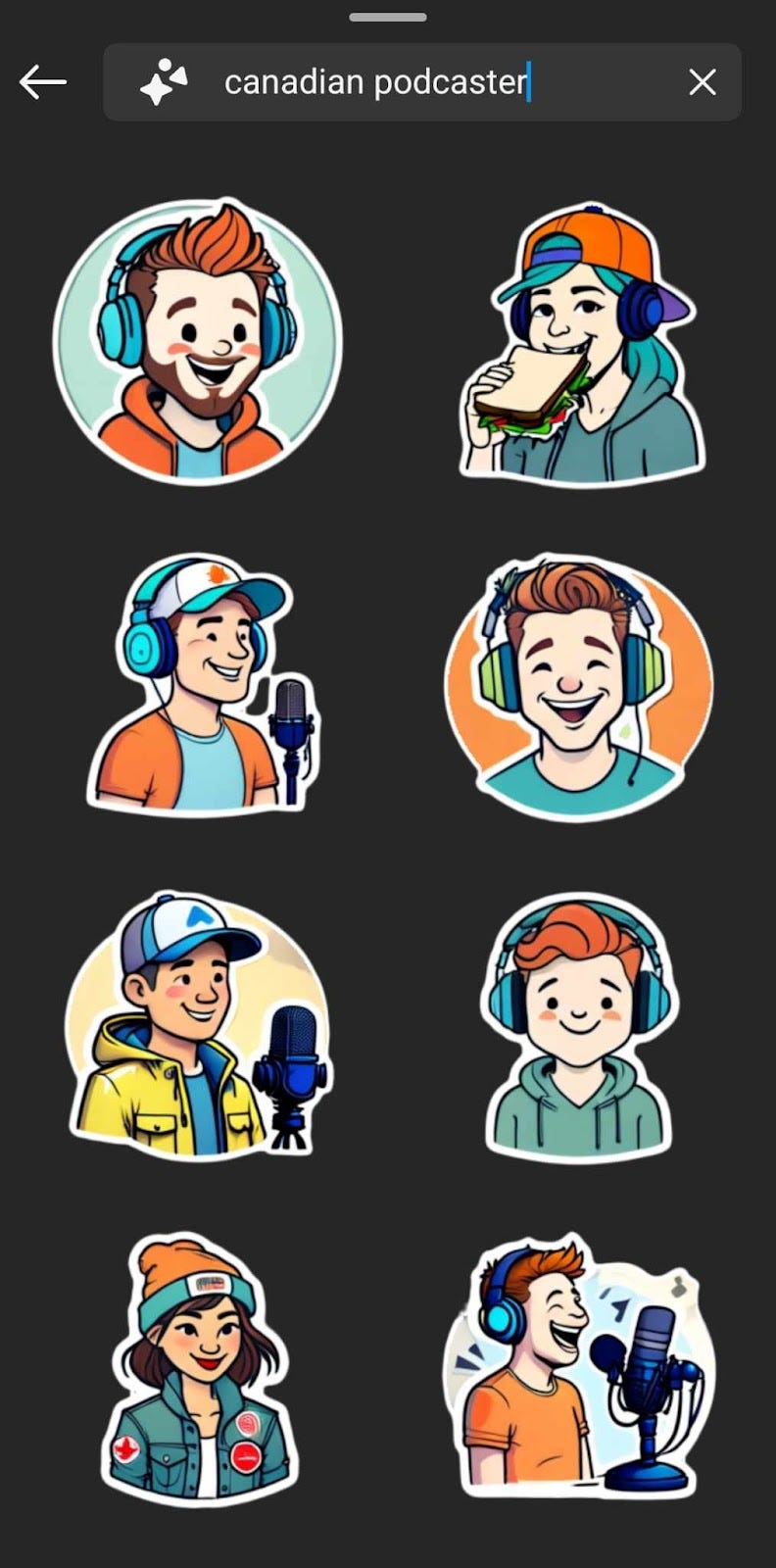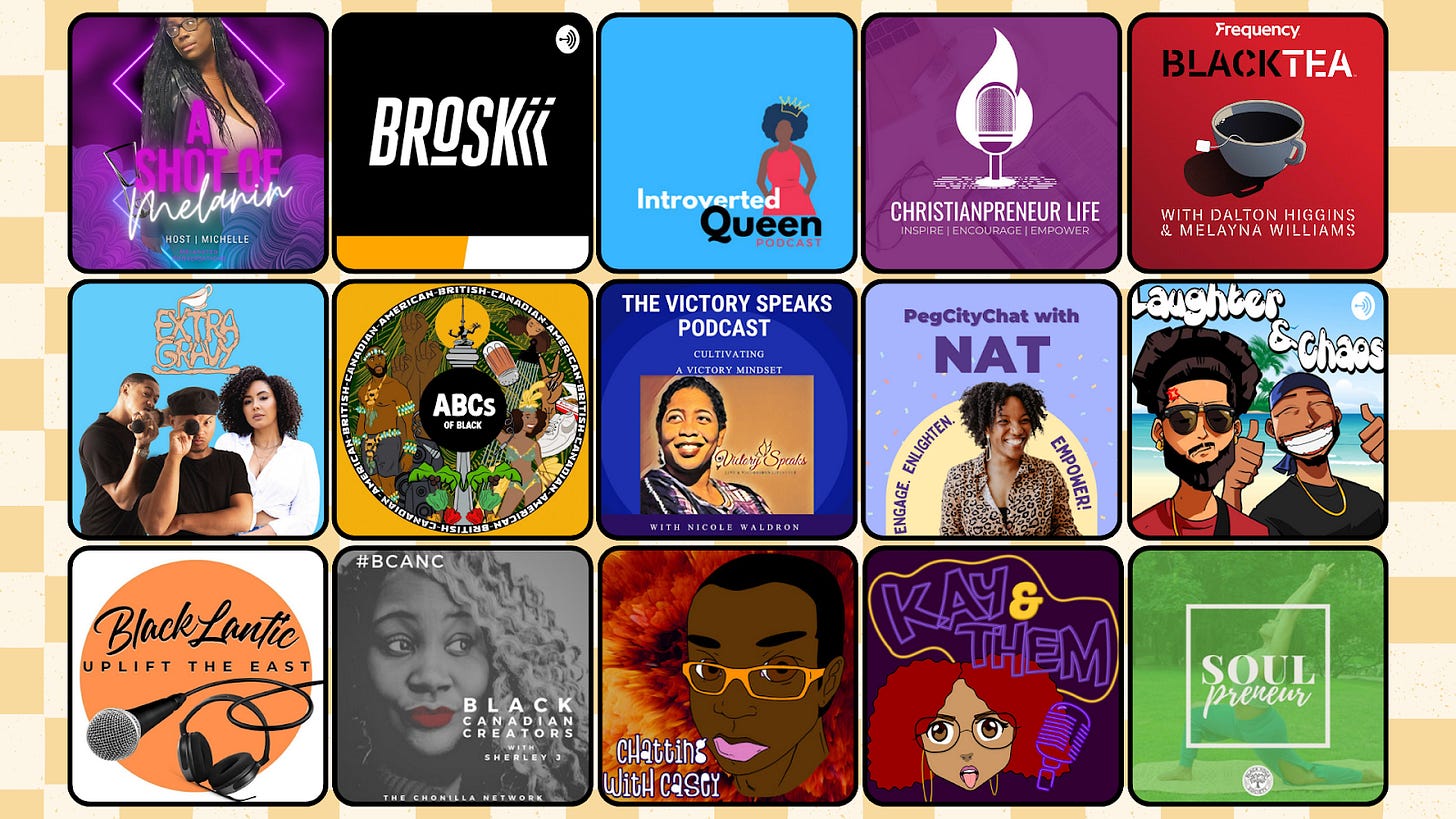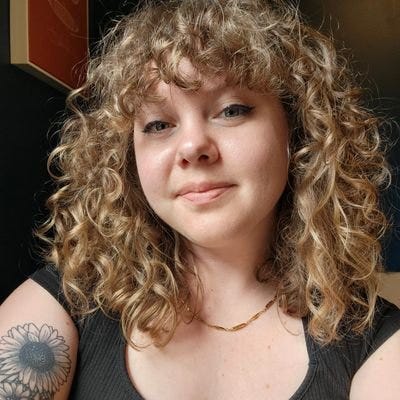SCOOP: The State of Play for Black Canadian Podcasters
Black Canadian content is set to drive Canada’s podcasting landscape, what now?
Feb 19, 2024.
When AI generation tools exploded last year, one of my favourite things to absolutely abuse was the launch of Meta’s AI Sticker tool – a tool in which you can type in a specific prompt like “unicorn flying an airplane” or “hot tub of Jell-o”, to which it would turn out various digital “stickers” that you could send to your friends over the DMs.
Of course, I typed in “Canadian podcaster”, and here’s what came up:
It goes without saying that the state of the Canadian podcasting landscape is something that I’m deeply interested in, and as most of us do, I often look at the successes of our ecosystem on a global scale – especially in comparison to the USA. Though we’ve seen some great examples of homegrown success stories in folks like Kristi Lee (Canadian True Crime) and Liv Albert (Let’s Talk About Myths, Baby!), it’s hard not to look at the multimillion dollar Spotify deals happening for American podcasters and wonder why that’s not happening here.
But let’s take a macro-lens look at this space for a second, because I believe that the true success of Canadian podcasts, on a global scale, lies in the health of our ecosystem and the strength of the representation within it.
I say this because recently, I was chatting with a Black Canadian Podcaster (who asked to be anonymous for this piece), about the state of the ecosystem and what exactly we, as indie podcasters, are working with. They brought up a more pressing question:
What, exactly, is the state of play for Black Canadian podcasters?
When Black Canadians decide to make a podcast, there are a number of questions that come up around the space that they’re entering – where their audience is, where the funding is, who will actually find their show, and how sustainable it will be to run their show.
One of the first concerns that this podcaster shared with me was knowing whether or not their podcast was actually reaching an audience of Black Canadians. “I'm focused on Black women and women of color with the guests that I curate, and types of conversations,” they told me. The problem is, the majority of their audience is American. “I know we have the numbers here, but it's [about] the audience listening to podcasts, and are they finding our podcast?”
How much do Black audiences make up Canada’s podcast listenership?
By way of comparison, the American-based Black Podcast Listener Report 2.0 reported last year that about 75% of Black monthly podcast listeners follow or seek out content that focuses on Black stories and perspectives.
But since we don’t have that same information from a Canadian context, we have to zoom out a bit and look at the larger picture of Canadian audiences, and do a little back-of-the-envelope guesstimations.
In the most recent Canadian Podcast Listener Report, it was found that for the time ever, Canadian podcasts finally have a larger share of listening by Canadians over American podcasts. Canadians, officially, listen to Canadian content the most!
Even more encouraging news: more than half of the Canadian population (55%) has ever listened to a podcast — so the demand for podcasts here is promising.
Breaking down which percentage of the population of Canadian podcast listeners make up Black audiences is information that’s been a little harder to find. I reached out to the team at Acast, who’ve been making their mark across the Canadian podcasting landscape, and they were able to share some of their audience insights with me – notably, that about 22% of BIPOC in Canada listen to podcasts weekly.
Combining the percentages of Black podcast listeners listed in the Cumulus Media And Signal Hill Insights’ Podcast Download – Fall 2023 Report – “Powerhouse”, “Intermediate” and “Newcomers” – I found that the Black podcast listening audience in the US makes up around 20% of podcast listeners.
Factoring in the 55% of the Canadian population who have listened to a podcast, my estimates round out at roughly 11% of podcast listeners making up the Black Canadian podcast listening audience (under the assumption that that audience is about the same as the USA).
Roughly 11% of podcast listeners make up the Black Canadian podcast listening audience.
But are Black Canadian audiences actually listening to Black Canadian content?
I reached out to Sherley Joseph, who runs The Chonilla Network and the Black Canadian Creators podcast, which aims to expand the type of content that Canadians are consuming and being entertained by. She told me that in her 10 years of podcasting and connecting with Black Canadian creators, when she asks them about what podcasts they’re listening to, they rarely mention Black Canadian content.
My anonymous source explained to me that, from their perspective, this might be because podcasting is still an early medium for Black Canadian audiences. “We're still getting adjusted and understanding what podcasts are. People are becoming more familiar with long form content because, for our community, I think it's still Reels, TikToks, maybe watching certain Youtubers.”
The reference to YouTube is notable because around 92% of racialized Canadians consume YouTube content every month. With YouTube’s latest RSS and podcasting integrations, maybe Canadian podcasts are actually due to meet Black Canadians where they’re at.
Despite the bit of mystery surrounding the numbers and demand for Black Canadian content, overall, the news is encouraging for Black Canadian Podcasters – especially those who are looking to serve fellow Black Canadians.
The podcast listener of the future might be a young black woman.
A study from Signal Hill Insights that looks at the future of podcast audiences found that half of podcast newcomers (people who’ve been listening to podcast for less than a year) are: between the ages of 18 and 34, they’re 50% more likely to be African-American, and 23% more likely to be a woman.
In fact, according to the Black Podcast Listener Report 2.0, Black women in America make up a larger percentage of podcast listeners than the general population of women-identifying podcast listeners.
Sherley pointed out an interesting comparison between the listener of the future and the representation of young Black women in Canadian podcasting; “That's who are creating a lot more podcasts,” she said. “If I just focus on Canada, so many of us are creating podcasts.”
The Signal Hill Insights study also outlined that with podcasts continuing to launch across all communities, an ongoing diversification of content is due to attract a more diverse audience.
Signal Hill Insights also predicts that podcasting listening by the ”listener of the future” is only expected to deepen, as podcast newcomers — who listen to an average of five and a half hours of podcasts per week — frequently turn into Intermediate and Pioneer listeners who listen to 5.8 and 7.6 hours of podcasts per week, respectively.
In addition to that expected growth, it could be likely that the demand for podcasts hosted by Black hosts is going to grow too.
The Black Podcast Listener Report 2.0 noted that the majority of Black podcast listeners in the US between the ages of 18-24 listen to podcasts with Black hosts (57%), which was significantly less than their older counterparts who said the same (35%).
The report also says that the ten most popular topics Black Americans enjoyed listening to were (from most popular to least): self-care, social/racial injustice cases, celebrity news/drama, Black films, and reality TV, financial mindfulness, #BlackExcellence, elections, Juneteenth, and climate change.
Again, a lot of these stats are American figures, so it’s hard to know for sure if we’re seeing similar stats north of the border – but it does tell me that it is likely that if Black Canadians aren’t already listening to Black Canadian podcasts, the demand for that content is on the rise, and those podcasts have something to look forward to.
A rise in demand for Black Canadian podcasts, but where are the Black Canadian Podcasters?
Sherley told me that she believes the community of Black Canadian podcasters is still in its early stage. “I feel in the Black Community as podcasters, we're like fetuses,” she told me. From Sherley’s experience, the community might mirror what Signal Hill Insights described as the podcast listener of the future – the success of which, resting on the backs of young people.
“I speak to so many content creators, different ages, different education. I do find the ones who podcast are very educated, especially the younger millennials. Younger [generations] when it comes to podcasting are so savvy, much more community oriented, much more open to collaborate compared to other content creators. The collaboration aspect is very low when it comes to the older generation.”
The promise of a Canadian podcast landscape that is driven by Black Canadian content is certainly exciting, but my anonymous source said that it might not be realistic until podcasting in Canada becomes more accessible and sees some important changes.
Why aren’t Black Canadian podcasts easier to come by?
According to both Sherley and my source, representation of Black Canadian podcasts and podcasters is still lacking.
“I think we're not being sought after the way that American content creators are,” said the anonymous podcaster. “In the Canadian landscape for podcasts, I feel like the focus isn't on Black creators. It would be nice to see a little bit more effort when it comes to [Black] talent retained [and] talent acquisition,” said my source.
Sherley shared a similar sentiment, and explained to me that her perception of retention and representation of Black podcast hosts on major Canadian networks isn’t great.
“If [network podcasts] do have a Black focus or [are] multicultural, it doesn't last, they're not retained. I don't know if it's because they're not getting enough support in order to keep going and have more seasons. I hate to say it, but if a network predominantly does not have within their executive team someone who is of color, BIPOC, or BIPOC of any shape or form, it almost feels like they'll have these shows for a little bit just to kind of say, ‘check mark, we did it, we covered the diversity’”.
Looking through the representation of diverse hosts on Canadian podcast networks certainly the minimal representation of Black hosts. Across 8 Canadian podcast networks outside of the Chonilla Network, out of 493 podcasts I was able to count around just 44 Black podcast hosts – about 9%. While there was also representation of other racialized groups, overall it was White Canadians that still represented the average podcast host throughout all of these networks.
One network that Sherley is currently in conversation with when it comes to supporting Black Canadian podcasters is the independently run Sonar Network. “What I appreciate about Sonar Network is that at least we're having a conversation in terms of collaboration with Chonilla Network and how to diversify our network,” Sherley told me.
I reached out to The Sonar Network to ask them about how they’re thinking about diversifying the network, and what those conversations with Sherley look like. “One of our goals for this year is to make a more conscious effort toward supporting podcasters from all communities and to diversify the content we offer,” Marianna Miniotis told me. “Coming out of the comedy community, it's easy to fall into the habit of working with friends and friends of friends, etc. And while we have made an effort to offer diverse and progressive content over the years, we realize we could and should be doing better.”
“BIPOC podcasters are definitely out there and doing amazing work,” Marianna went on to say, “Our challenge is how can we make our network and our resources available and more welcoming for BIPOC creators?.”
Lack of representation on networks and even in charts outside of the off Apple Podcasts editorial playlist is one of the reasons that Sherley, along with Casey Palmer (Chatting with Casey!) and Kaya Marriott (Comfy Girl With Curls) built the Black Canadian Podcast directory. “We were conscious to make it searchable in order to eliminate that excuse of, ‘but where are the Black Canadians?’”
Sherley says that when it comes to recognition of Black Canadian talent, podcasting is lagging behind. “Traditional media has caught up a little in Canada,” said Sherley. “It took 2022 to finally have some kind of award that celebrated Black artistry and Black content creators [...] When it comes to content creation, let alone just focusing on Black podcasts in Canada, we are nowhere near where traditional media is just finally recognizing content creators in the Black Canadian landscape.”
Fair representation of Black Canadian podcasts is also being impacted when it comes to funding. Notably, according to a recent announcement from Virginia-based, Black-owned podcast network, ALIVE, podcasts from Black creators have also been overlooked for monetization opportunities with advertisers due to keyword-based suitability and safety technologies that safeguard advertisers. ALIVE recently announced their partnership with Barometer that is aiming to address this problem, explaining in a press release that they’re looking to drive equitable monetization through “accurate data on brand suitability and safety” and “Barometer’s contextual analysis engine [that] debunks stereotypes associated with Black content by quantifying inaccuracies and highlighting their potential harm.”
What else needs to happen to see Black podcasters thrive in Canada?
Sherley shared one idea in particular that could completely shift the Canadian podcasting ecosystem in a way that most of us might agree would be welcomed: collaboration between industry giants in supporting independent podcasters.
“I wish that [podcast] companies and all these networks [would] come together to start having a conversation. Especially in Canada, to go to the CRTC or whoever, to be like, ‘look, we have to come up with ways to help support independent podcasters,’” Sherley told me, explaining that with more support from media desicion-makers in Canada, we could see even more diversification and uplifting of independantly produced Canadian podcasts.
“I think they would be the best voice [rather] than the independent podcasters. Help us and go to all these types of places that you get grants for creating content, and talk to them and say, ‘you guys need to include more”.
Thank you to Sherley Joseph and the wonderful anonymous Black Canadian podcaster for their support on this piece.
If you have thoughts or Canadian podcasting news, please share them with me! Leave a comment or reply to the newsletter email.
If you’re feeling generous there are a couple ways to financially support Pod the North at any budget: opt-in to pay for this Substack on a monthly or yearly basis, buy me a coffee, or buy an ad!
Thanks for supporting Pod the North, I’ll be back with more tomorrow!
Kattie
@Podkatt (Twitter, Spotify, and Goodpods) | @ PodtheNorth (Bluesky)










Love this Kattie. Thank you the report and to your guests for the thoughtful suggestions. Received. ✌🏻
I'm grateful for the opportunity to share and shine a light on such an important topic. I also learned some great stats from this article. Thank you, Kattie, for the conversation.